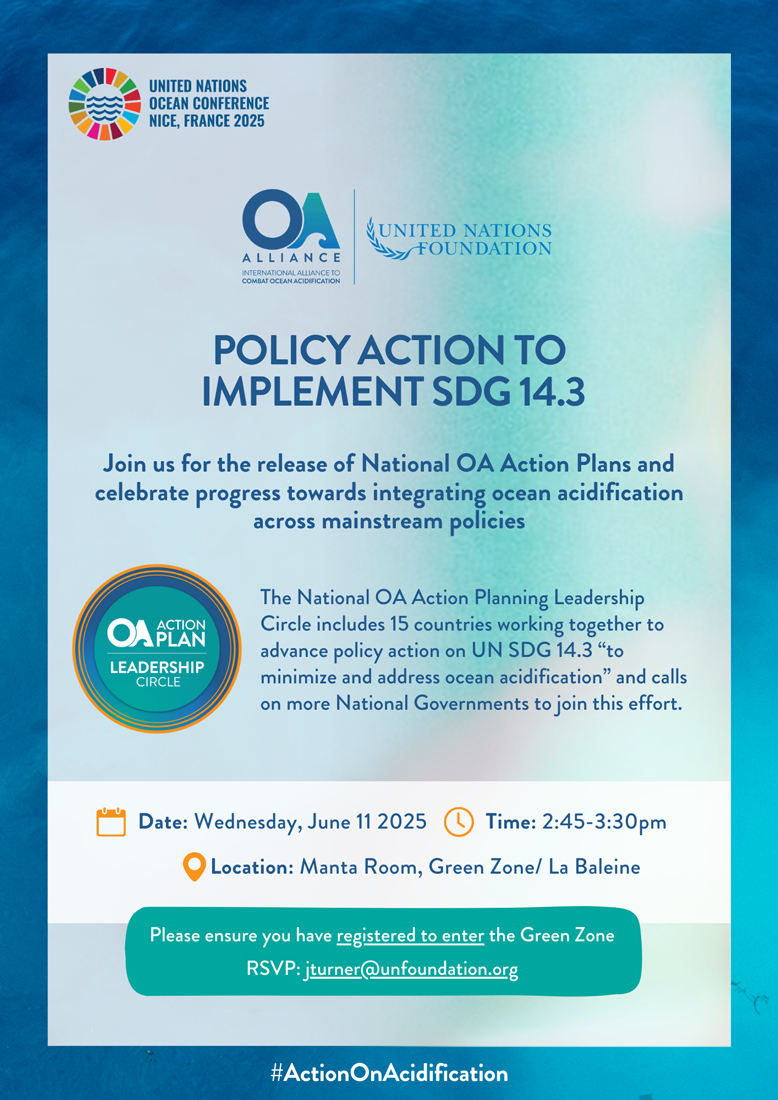Time for Action on Acidification: OA Alliance's Ambition for UNOC3
The upcoming UN Ocean Conference (UNOC3) in Nice represents a vital moment for policy action on ocean acidification. Governments can no longer afford to overlook acidification in mainstream policy agendas — an essential part of the ocean-climate nexus that threatens healthy marine ecosystems, fisheries, and aquaculture on which blue economies and citizens’ wellbeing depend.
This is why the International Alliance to Combat Ocean Acidification (OA Alliance), alongside our 145 members across 25 countries, is committed to building collective momentum and securing an important place for acidification and climate change on this year's multilateral agenda. We plan to raise ambition and catalyze change through three strategic streams of action:
Stream #1 Broadening Political Leadership
To build on political momentum, we are hosting “Policy Action to Implement SDG 14.3” on June 11 at 2:45-3:30pm, which will include the release of OA Action Plans and celebrate progress shown by members of the National OA Action Planning Leadership Circle.
The leadership circle includes 15 countries working together to advance policy action on UN SDG 14.3, “to minimize and address ocean acidification”, and calls on more national governments to join this effort.
When it comes to political coalitions, it’s not only the number of allies that matters, but also their diversity of perspectives and experiences. Since its inception, the OA Alliance has been honored to work alongside Indigenous and Sovereign nations. This year in Nice, we will be joined by the Makah Tribe, who will unveil their unique OA Action Plan addressing issues such as food sovereignty and the cultural practices and traditions they are fighting for in the face of increasing acidification and ocean change.
Stream #2 Defining Science for Action
We cannot manage what we do not measure. That is why, as an implementing partner of the UN Decade's Ocean Acidification Research for Sustainability (OARS) program, we have helped identify the most useful ocean acidification science and information for 6 decision-making outcomes.
On Monday June 9 from 2:00 - 5:00pm ( including reception and social hour) , we'll gather at the historic Le Negresco hotel to unveil the OA Information for Decision Making Framework at our "Science to Action on SDG 14.3" event. This framework bridges the gap between scientific knowledge and practical policy outcomes, offering case studies that illuminate new ways to protect marine resources and build resilience in coastal communities.
Stream #3 Engaging Through Creativity
To help UNOC attendees better understand ocean acidification and what is at stake, we are embracing the power of art. Because every change in our ocean tells a story — of ecosystems, communities, and livelihoods that face new challenges and dwindling resources. Yet these often worsening realities are still obscured by complex narratives and scientific jargon.
To bring these stories to life, we ask: What would the ocean look like if the color of seawater could change as it becomes more acidified? Would that make it easier for us to notice shellfish that are struggling to grow, populations of fish that are shrinking, and corals that are becoming dangerously fragile? If we could see these changes, would we choose to do something about it before it’s too late?
“Carbon in the Current: Contrasting Futures for Our Changing Ocean" takes the viewer on a visual journey to experience the unseen impact of climate change on our ocean. This 3D digital artistic animation by the extremely talented 3D artist and motion designer Jacob Stillman immerses viewers in a vibrant digital animation that enables us to see, hear, and emotionally feel what ocean acidification means for marine resources and human communities.
The Confluence: Join Us in Taking Action
Whether you are driving policy, advancing science, or calling civil society to action, we invite you to join this growing current of change.
If you are a member of a government or organization curious to explore a partnership, we would be delighted to connect. Simply write to Mariama Fofana: mfofana@unfoundation.org to set up a meeting in Nice.
If you are a member of the press and want to learn more about ocean acidification, connect with our media liaison Rachael Perrett: rachael@meridian.agency
If you want to help us spread the word and learn how to experience the 3D digital artistic animation, follow us on social media for the latest updates.
The ocean has been patient enough. Now it’s time for action.
#ActionOnAcidification



